 ★★★
★★★
“English? German? – ENGLISH? GERMAN??”
The term “Netflix Original” covers a range of productions, from pre-made movies they buy for distribution, through to movies commissioned from the ground up by the company. The results are equally variable. For every What Happened to Monday, there’s an Interceptor. This one came out of Germany: not exactly renowned for action, particularly action heroines. But it quickly and unexpectedly became the most-watched foreign language movie on the streaming service, worldwide. Does it deserve the success? We watched it and wrote up our thoughts independently, which have been edited and combined below. But, first: some introduction, and let’s find out what the movie is about.
Dieter: This movie was produced by long-established studio German Constantin Film, who in the 60s gave us the famous (or notorious, depending on your perspective) Karl May westerns, as well as German Edgar Wallace thrillers. It went bankrupt in the 70s but was saved and lead to new successes due to late producer Bernd Eichinger. He produced films such as The Never-ending Story, The Name of the Rose, House of Spirits, the first Fantastic Four movie (yes, that was German), the Resident Evil series and Downfall. After his death Constantin Film has mostly been hit and miss.
Interestingly, in the end credits you can see that Oliver Berben was involved in its production. Berben is a successful producer, now leading manager of Constantin Film, and son of well-known German actress Iris Berben, who played detective inspector Rosa Roth for a good 2 decades on TV. He has produced a number of movies with her in the leading role, as well other movies and countless TV productions. His most well-known movie might be Roman Polanski’s Carnage, with Jodie Foster. I’m not sure if this movie was produced by Constantin, then sold to Netflix, or if Netflix “ordered” Constantin Film to produce the movie. Looking at the results, I get the feeling this was from the get-go a collaboration between the two.
Jim: The heroine is Sara Wulf (Goursaud), a former Bundeswehr soldier, whose husband was killed in action, and who suffers from a touch of PTSD herself. She’s working to move to the US with her son, Josh, and has a visa appointment at the consulate in Frankfurt. But while she’s waiting to be seen, Josh vanishes. The consular chief of security, Erik Kynch (Scott) is sympathetic, until the surveillance footage shows Sara arriving alone. She’s locked up pending her being escorted off the premises. But, naturally, she escapes, and encounters a young woman (Abova), being held in an apartment in the complex. They agree to help each other – but it increasingly becomes clear that there’s a lot more going on than a missing child.
Dieter: Color me surprised when finding out the movie is… not bad at all. Actually, it is quite watchable. While the typical “diversity agenda” of Netflix is at play here, fortunately, there is no virtue-signaling, and I’m happy for it. I had some problems with Sara being a “special forces elite soldier” and “combat trained”. It’s true German soldiers were in Afghanistan but they were not involved in any combat missions but were mainly helping in re-building projects, or the training and aid of Afghani security forces. Since the end of World War II, Germany has had a strict rule of not getting involved in any military battles with the idea “that no war should ever come from Germany again”. So, a German soldier being involved in a direct military action, as scenes in this movie seem to indicate, is highly questionable.
 Also, German “elite forces”? I don’t know. I won’t say it is impossible: there are probably certain groups for specific tasks that I am not aware of. But having done my – at that time obligatory – army service in the Bundeswehr 30 years ago, I have my doubts. I’m willing to suspend my disbelief here. The movie echoes popular action thriller plots of the past such as Jodie Foster’s Flight Plan and Panic Room, Angelina Jolie’s The Foreign Son, and of course Liam Neeson’s Taken. So, the plot won’t win any awards for originality. It’s also happy to re-use elements from other sources: Tom Cruise window climbing; Mel Gibson shoulder dislocation; or a MacGyver-like improvised explosives.
Also, German “elite forces”? I don’t know. I won’t say it is impossible: there are probably certain groups for specific tasks that I am not aware of. But having done my – at that time obligatory – army service in the Bundeswehr 30 years ago, I have my doubts. I’m willing to suspend my disbelief here. The movie echoes popular action thriller plots of the past such as Jodie Foster’s Flight Plan and Panic Room, Angelina Jolie’s The Foreign Son, and of course Liam Neeson’s Taken. So, the plot won’t win any awards for originality. It’s also happy to re-use elements from other sources: Tom Cruise window climbing; Mel Gibson shoulder dislocation; or a MacGyver-like improvised explosives.
Jim: Yeah – I may have yelled, “A few household chemicals in the proper proportions” at the screen there! I thought this was entertaining. It’s main strength is Goursaud, who manages to be both a bad-ass and a vulnerable mother, often simultaneously. She comes across as fairly credible in the fights, even when going up against bigger opponents. The script puts some effort into establishing her credentials, and she has a lithe toughness to her which works well.
Dieter: You must understand: we Germans are pretty lousy when it comes to action movies. The few there are, usually have actors attempting a weak, second-rate impression of the American attitude of “Look how big my balls are”. This always feels fake, because we Germans simply don’t see ourselves like that. We have no problems seeing us in roles of evil Nazis or “the good German”, e. g. Armin Mueller-Stahl, but hardly ever as action heroes. That definitely has to do with our history, the idea of “German heroism” being exploited and abused by the Nazis. So at first I was going to dismiss the movie as not interesting.
Surprisingly, it doesn’t commit the usual mistake of making its protagonist an unbeatable heroine. To “do it the German way”, you must put things into a more nuanced context. We wouldn’t expect it from an American movie, but definitely would in a German one. I know it’s unfair to home-grown productions, but we judge them on a different basis. Yes, there is the early scene where Sara gets pushed around and immediately gets into combat mode (because… you know… PTSD). But I think it’s the only scene I found unbelievably overdone. I feared the movie would continue that way – but luckily it didn’t!
Instead, it shows that – in contrast to someone like Angelina Jolie in Salt – though she is “trained for this” as she says, the reality sets in quickly. Even a single man with some combat training is always in a better position and will eventually overpower her. If she wins a fight, it is because she uses everything at her disposal in her environment. There seems to be an extra shot of adrenaline when push comes to shove and her trauma sets in. Nothing is won easily for the protagonist here and female power fantasies are left at the door! The fact that Goursaud actually has some muscles, is a further plus.
Jim: There might be a bit less actual action than I expected, but what there is, is done well, with a couple of sequences edited together to look like a single take. The peak is likely a battle against two assassins in an apartment. It’s no Atomic Blonde, in length or quality. Then again, who is? I also appreciated the way she’s not infallible. Witness the way her first attempt to get around the consulate, ends in her bouncing off a balcony, and falling to the ground.
Dieter: The acting is for once not a distraction, as so often in German movies. German-French actress Goursaud is in most scenes very believable, playing a stressed mother as well as in combat mode. Lera Abova who plays the role of Russian Kira doesn’t fare quite so well. Despite being Russian, I never got the feeling that she was, and sometimes had problems understanding what she was saying: she definitely had no Russian accent either.
The big surprise was Dougray Scott, who last time I saw him, had a role in Desperate Housewives. I could imagine that a consular officer would react exactly as he did in the situations here. What really stood out were his German language skills, speaking fluently with only a very slight accent. You have to understand how difficult it is to speak German like that. The movie refers to it in the beginning, when Sara demonstrates to her son how his father spoke German with a broad American accent. Contrast a scene in Tomorrow Never Dies where Pierce Brosnan spoke in German and I couldn’t understand what he was saying. The language skills Scott demonstrates in this movie here are excellent. And I say that as a German. I was mightily impressed.
Jim: I noticed in the end credits that there were two dialogue coaches for him: one to speak German and the other to help him sound American. Seems like both did their job! Chris found no reason to complain about the latter, and she has an ear for that, both in English and Spanish (you should hear her eviscerate any non-Cubans trying to sound Cuban!). While I’m here, I noticed that the credits listed an “intimacy co-ordinator”. Weird, since there was nothing at all on screen to suggest one would be needed. Maybe Zübert is going to pull a Zack Snyder and realize an unrated cut, with all the missing sex and violence?
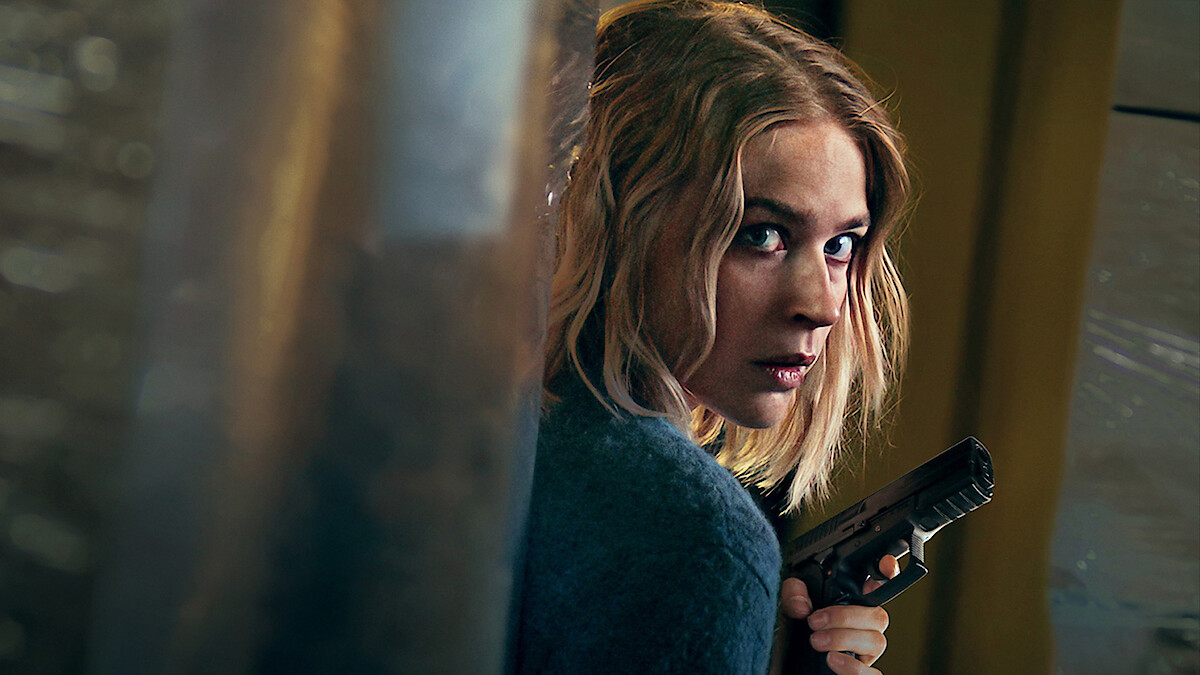
Dieter: The most fascinating thing for me was the consulate itself. I’ve never been in one, so I don’t know, but I could imagine that it might look like this. You get the feeling this is not just a building but almost its own village with an auditorium, conference and office rooms, warehouse, cafeteria, locker rooms, swimming pool, nursery, hospital room, guest apartments, truck departure hall and safety room. Are consulates really that big? Or was that made up? The movie is supposed to take place in Frankfurt, Germany’s fifth-biggest city, and early shots of the city and its central station are genuine. So I was quite surprised to read in the end titles “filmed in and around Vienna”. Aha…???
Jim: I was less enthralled with the story. There are points where it seems like a parade of clichés, such as the PTSD, which never serves much purpose. Or the scene at the end, where the villain lays out his plan to the heroine in all its intricate detail. It’s also crafted to raise questions, such as what would have happened if Sara hadn’t unilaterally decided to leave Josh alone in the consulate play-room? It’s certainly quite easy to come up with simpler ways for the bad guy to achieve his goals.
Dieter: The whole plot has a typical thriller solution which is a bit far-fetched and over-complicated. But I liked the idea of the villain of the piece giving an explanation for his actions. The previous day, I had seen Steven Soderbergh’s spy thriller Black Bag, and the characters’ emotions and motivations seemed thin, and not quite understandable. Kudos to the writers here for creating believable motives and emotions.
Jim: Despite my qualms about the script, it’s not significantly worse in this area than your typical straight-to-video actioner. That might be the best way to approach this, as a throwback to a simpler era, where one man – or woman now – could go up against a parade of enemies, and emerge battered but unbowed. I’m certainly happier to see my Netflix subscription used towards this kind of thing than overblown nonsense like The Electric State.
Dieter: A little tidbit: When I graduated, I briefly considered applying for jobs in German embassies overseas. One big drawback was being regularly required to move to other places in the world, making it difficult to settle anywhere and build a life. This is one reason the villain here gives for his acts and it absolutely made sense to me. But overall, this was a good action movie, and from Germany, no less. Even a believable, and perhaps the first real, girls with guns movie from here. It’s really astonishing to me. I expected this to fall flat on its face, especially when replicating American action formulas. But despite my utter disbelief something like this could be possible from my country, the film succeeds. Signs and wonders still do happen, as we used to say here!
Dir: Christian Zübert
Star: Jeanne Goursaud, Dougray Scott, Lera Abova, Kayode Akinyemi





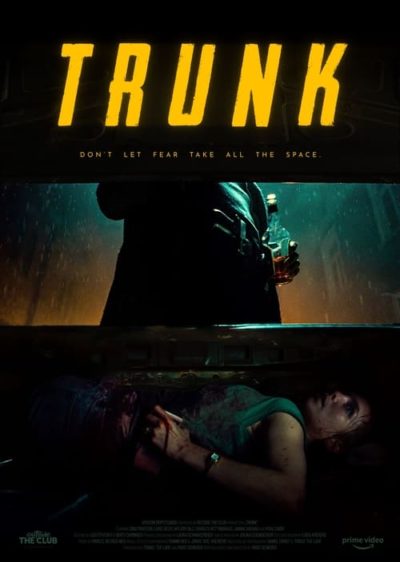 This certainly wastes no time. Malina (Martens) regains consciousness to find herself in the trunk of a car stopped at a petrol station. Things get worse, as she discovers her legs are paralyzed, and she has a nasty wound in her lower abdomen. How did she get there? And more importantly, what can she do to escape her predicament? It’s certainly one hell of a hook, and in the way it hits the ground running – as well as its Germanic origins, almost real-time approach and the plucky heroine with a sketchy boyfriend, forced to survive on her own – reminded me of
This certainly wastes no time. Malina (Martens) regains consciousness to find herself in the trunk of a car stopped at a petrol station. Things get worse, as she discovers her legs are paralyzed, and she has a nasty wound in her lower abdomen. How did she get there? And more importantly, what can she do to escape her predicament? It’s certainly one hell of a hook, and in the way it hits the ground running – as well as its Germanic origins, almost real-time approach and the plucky heroine with a sketchy boyfriend, forced to survive on her own – reminded me of  There seem to have been quite a few movies out of Europe over the past couple of years, about the female soldiers fighting in Kurdistan for independence with the PKK and related groups. French films
There seem to have been quite a few movies out of Europe over the past couple of years, about the female soldiers fighting in Kurdistan for independence with the PKK and related groups. French films 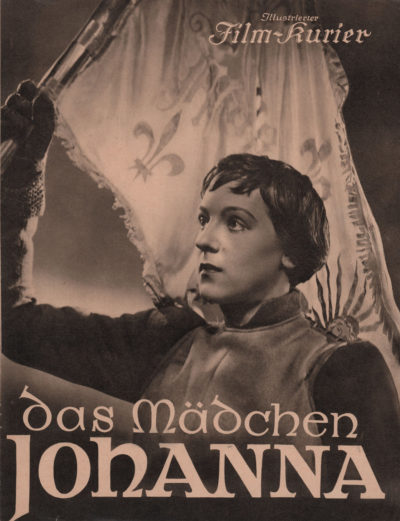 It’s basically impossible to separate this from the time and place in which it was made: that being Nazi Germany, just a few years before the outbreak of World War II. The portrayal of, not only Johanna/Joan of Arc, but the rest of the participants, has to be read in this light. It certainly explains why neither the English nor the French sides exactly come over as covered in glory. From the former camp, we have Lord Talbot, who is cruel to an almost cartoonish degree. On the latter we have King Charles VII (Gründgens), who is cynical to a fault, and has no qualms at all about using Joan when convenient, then discarding her when she isn’t.
It’s basically impossible to separate this from the time and place in which it was made: that being Nazi Germany, just a few years before the outbreak of World War II. The portrayal of, not only Johanna/Joan of Arc, but the rest of the participants, has to be read in this light. It certainly explains why neither the English nor the French sides exactly come over as covered in glory. From the former camp, we have Lord Talbot, who is cruel to an almost cartoonish degree. On the latter we have King Charles VII (Gründgens), who is cynical to a fault, and has no qualms at all about using Joan when convenient, then discarding her when she isn’t. This is not your normal action heroine film. Nor is it your normal zombie apocalypse film. While it certainly nods in both directions, it seems entirely committed to going in its own direction. My mental jury is still out on whether or not this was a good thing or not. I think if I’d perhaps been prewarned what to expect, I might have been better equipped to handle this. It takes place after the outbreak of a plague, with the dwindling number of survivors now holed up in two cities: Weimar, where infection is an immediate death sentence, and Jena, reported to be trying to research a cure.
This is not your normal action heroine film. Nor is it your normal zombie apocalypse film. While it certainly nods in both directions, it seems entirely committed to going in its own direction. My mental jury is still out on whether or not this was a good thing or not. I think if I’d perhaps been prewarned what to expect, I might have been better equipped to handle this. It takes place after the outbreak of a plague, with the dwindling number of survivors now holed up in two cities: Weimar, where infection is an immediate death sentence, and Jena, reported to be trying to research a cure. 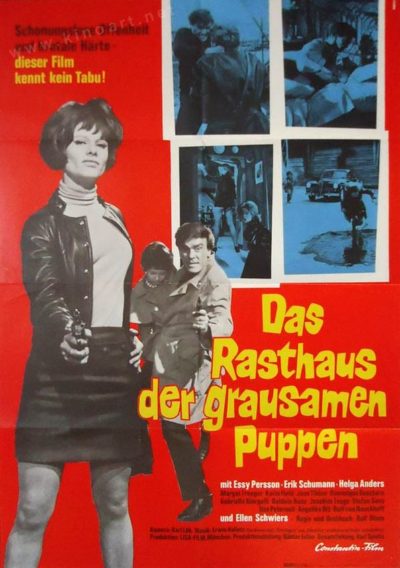 I’m usually not a too big fan of trash movies, because a lot of them are not so much trashy, as they are boring. Nevertheless, I’m always in for a good, entertaining bit of trash, as long as I don’t find it
I’m usually not a too big fan of trash movies, because a lot of them are not so much trashy, as they are boring. Nevertheless, I’m always in for a good, entertaining bit of trash, as long as I don’t find it 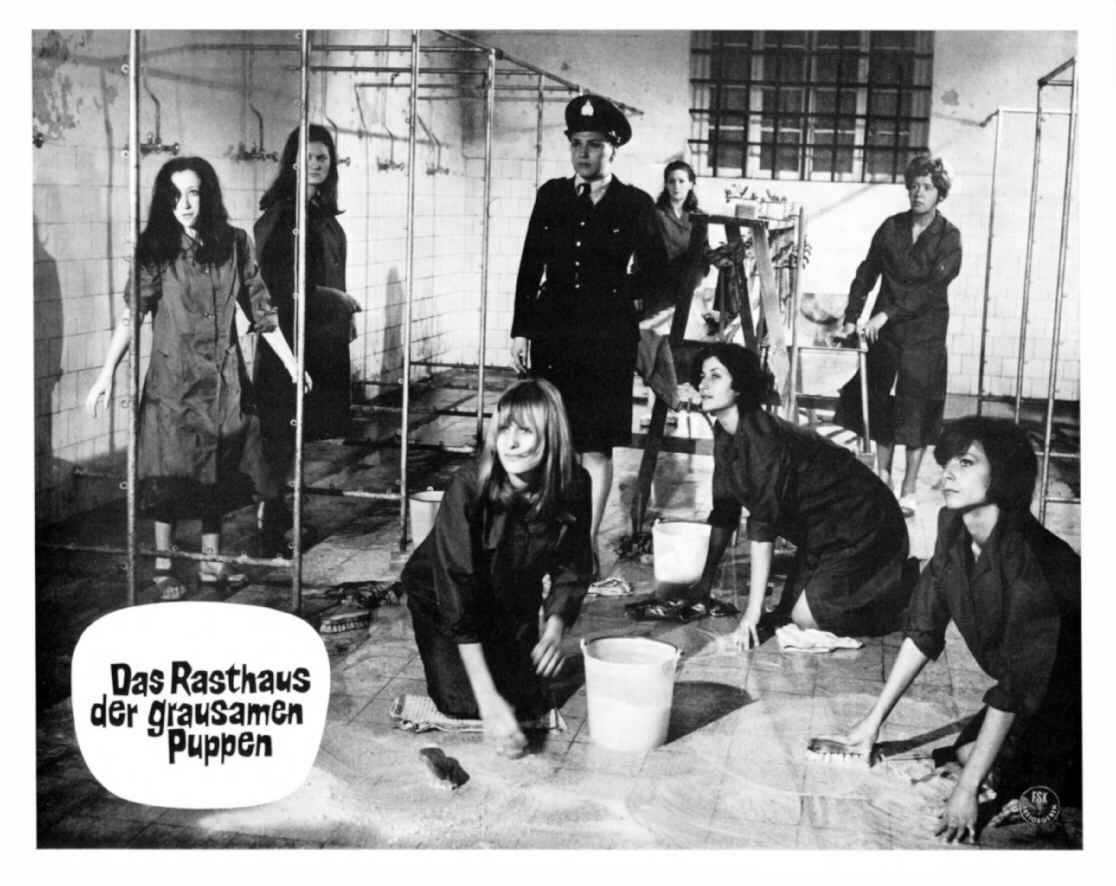 The setting and style – production design, costumes, cars – reminded me strongly of the Edgar Wallace movies. At the same time, you see women appearing as erotically as they could without ever being nude. Add to that the typical wooden acting of an Edgar Wallace movie, and you have an involuntary comedy of the highest order. I was screaming my head off because I found it hilariously stupid, especially when some of the actors tried to be “very emotional” and over-acted, without being able to be convincing. Also, I had to laugh at Betty killing off nearly everyone who has the misfortune to be in her line of fire. She is very trigger-happy and has a tendency to shoot first and ask questions… never.
The setting and style – production design, costumes, cars – reminded me strongly of the Edgar Wallace movies. At the same time, you see women appearing as erotically as they could without ever being nude. Add to that the typical wooden acting of an Edgar Wallace movie, and you have an involuntary comedy of the highest order. I was screaming my head off because I found it hilariously stupid, especially when some of the actors tried to be “very emotional” and over-acted, without being able to be convincing. Also, I had to laugh at Betty killing off nearly everyone who has the misfortune to be in her line of fire. She is very trigger-happy and has a tendency to shoot first and ask questions… never.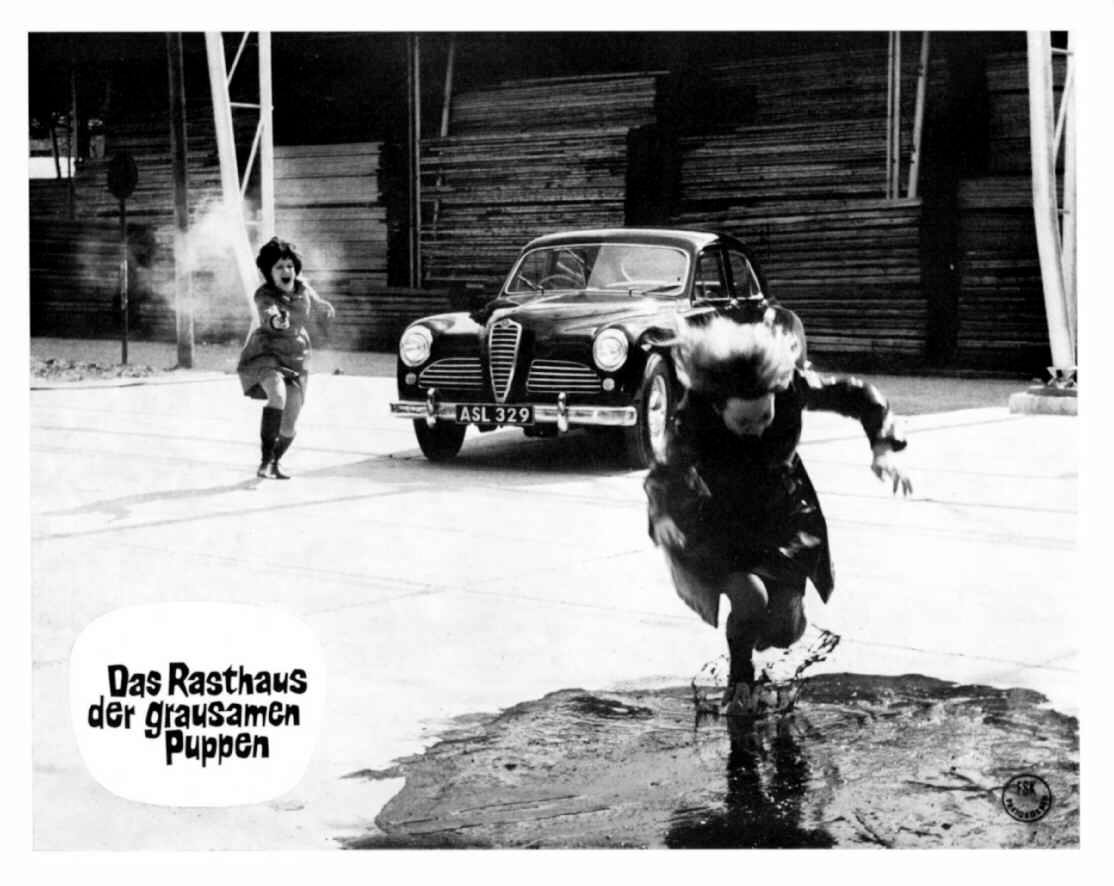 No, this is to be taken as seriously as long-running German TV series Hinter Gittern (Behind Bars), about a women prison. Which means: not at all! I always thought this genre came into existence in America in the 70s, having seen movies such as
No, this is to be taken as seriously as long-running German TV series Hinter Gittern (Behind Bars), about a women prison. Which means: not at all! I always thought this genre came into existence in America in the 70s, having seen movies such as 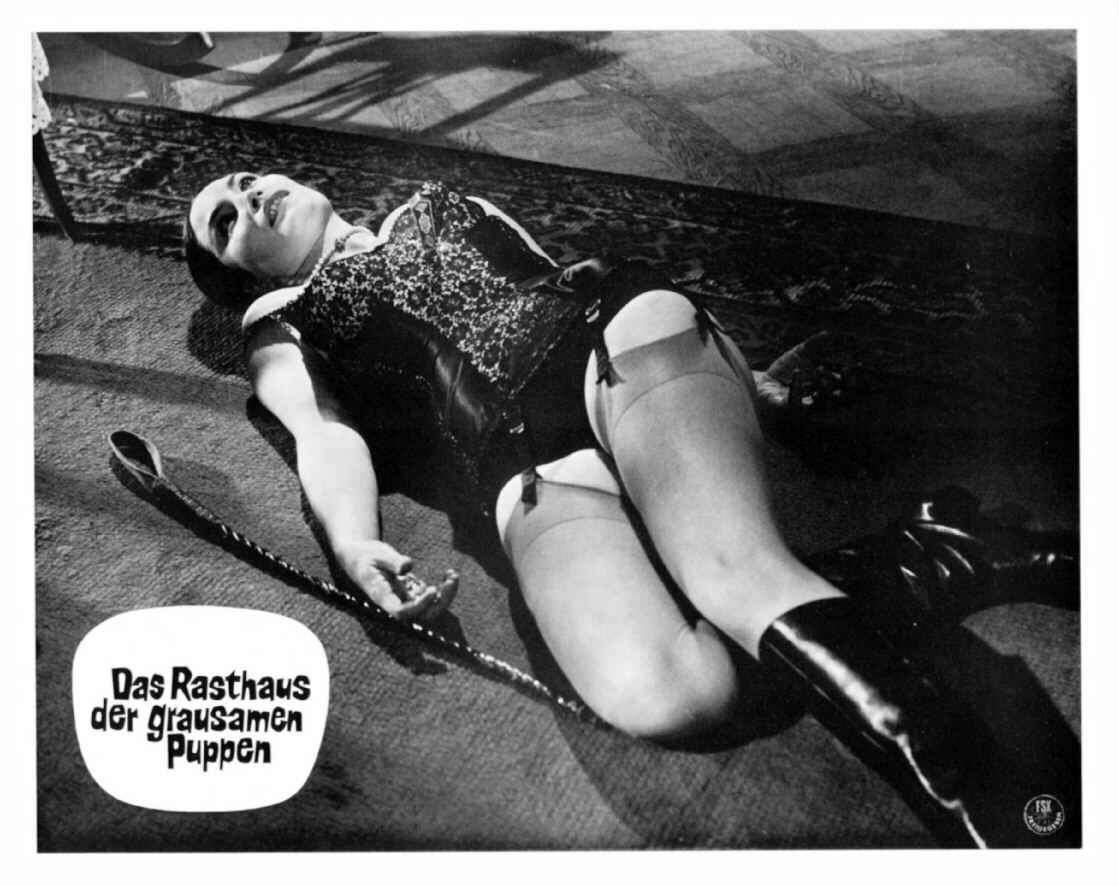
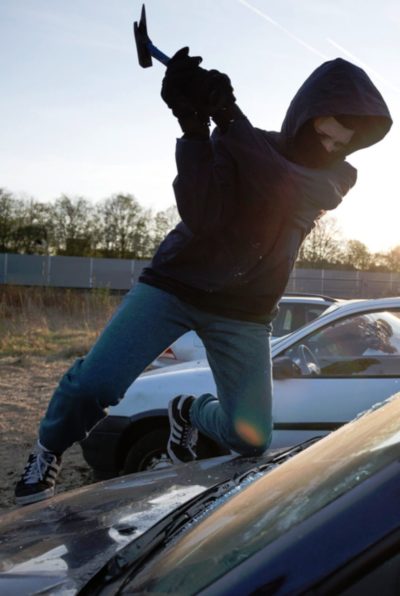
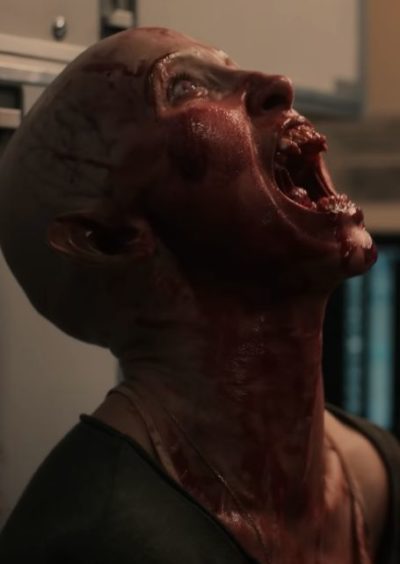
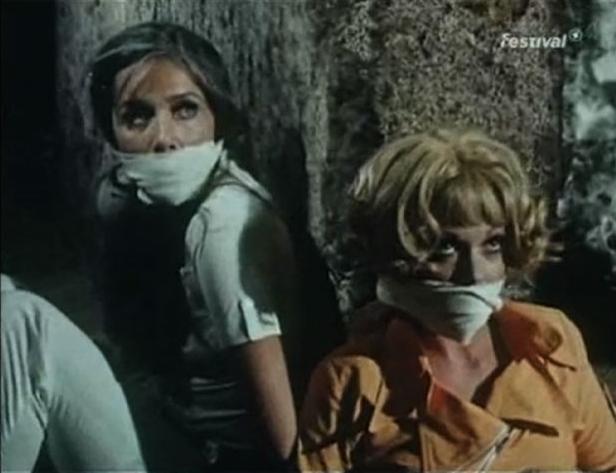 What sounds like a mid-60s promotion intro to The Avengers (John Steed + Emma Peel, not the other ones!) is indeed a spoken monologue. And it leads into one of the strangest oddities in the “girls with guns”-subgenre, which still can surprise me when I dig out something new. Now, I don’t want to summarize the whole of German film-making history, but I think a couple of words would actually be quite helpful in this case, before we get under way.
What sounds like a mid-60s promotion intro to The Avengers (John Steed + Emma Peel, not the other ones!) is indeed a spoken monologue. And it leads into one of the strangest oddities in the “girls with guns”-subgenre, which still can surprise me when I dig out something new. Now, I don’t want to summarize the whole of German film-making history, but I think a couple of words would actually be quite helpful in this case, before we get under way. And while American cinema gradually got its mojo back, as film makers like Spielberg, Lucas and others fully reinvented the fantastic film, that never happened to Germany. It initially suffered from state-funded “author’s cinema”, resulting in very boring movies, mostly forgotten today. But it mainly degenerated into very average and (in my personal opinion, mostly lame) TV-crime shows. They lacked the wonderful mixture of over-the-top, unambiguous heroes and villains, uncanny horror-like atmosphere and outlandish plots of the Edgar Wallace movies of the 60s.
And while American cinema gradually got its mojo back, as film makers like Spielberg, Lucas and others fully reinvented the fantastic film, that never happened to Germany. It initially suffered from state-funded “author’s cinema”, resulting in very boring movies, mostly forgotten today. But it mainly degenerated into very average and (in my personal opinion, mostly lame) TV-crime shows. They lacked the wonderful mixture of over-the-top, unambiguous heroes and villains, uncanny horror-like atmosphere and outlandish plots of the Edgar Wallace movies of the 60s.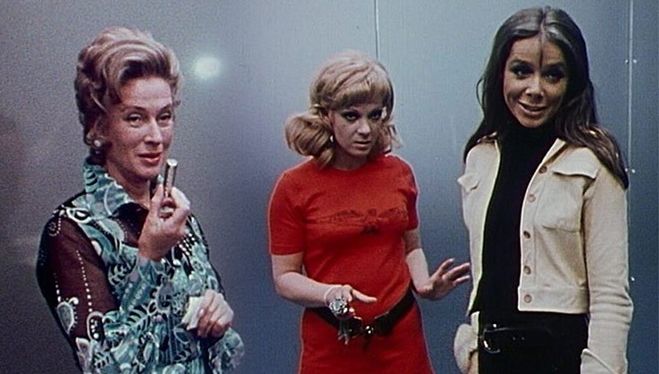 Upon closer inspection, I get the impression the makers of this show must have been inspired by shows from abroad. In the mid-60s, the Steed/Peel Avengers enjoyed great success on German TV screens. There was the similar themed Department S and I’m quite sure the original Mission Impossible series also ran on TV in the early 70s. Though, Okay, S.I.R. can’t for a moment compete with these much better shows, it is by German standards a miracle such a series was produced at all. The 70s in Germany still weren’t a time when anything fantastic would be embraced. Heck, when the first Star Wars came out, that movie was heavily lambasted by critics as “fascism in space” and “fantastical nonsense” that would spoil the youth.
Upon closer inspection, I get the impression the makers of this show must have been inspired by shows from abroad. In the mid-60s, the Steed/Peel Avengers enjoyed great success on German TV screens. There was the similar themed Department S and I’m quite sure the original Mission Impossible series also ran on TV in the early 70s. Though, Okay, S.I.R. can’t for a moment compete with these much better shows, it is by German standards a miracle such a series was produced at all. The 70s in Germany still weren’t a time when anything fantastic would be embraced. Heck, when the first Star Wars came out, that movie was heavily lambasted by critics as “fascism in space” and “fantastical nonsense” that would spoil the youth.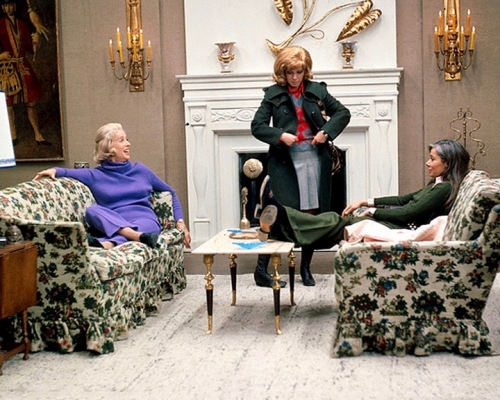 The series is mainly what we would call “camp” today. It’s a very odd TV relic from the early 70s, though I had a lot of fun watching the series. Just to see the hairstyles, fashion, cars or interior designs of that time is always a marvel to behold for me! The girls themselves… truth is, they both lack a bit charisma. One would wish for them to have some good banter, clever lines of dialogue, tongue-in-cheek humor – or at least some
The series is mainly what we would call “camp” today. It’s a very odd TV relic from the early 70s, though I had a lot of fun watching the series. Just to see the hairstyles, fashion, cars or interior designs of that time is always a marvel to behold for me! The girls themselves… truth is, they both lack a bit charisma. One would wish for them to have some good banter, clever lines of dialogue, tongue-in-cheek humor – or at least some 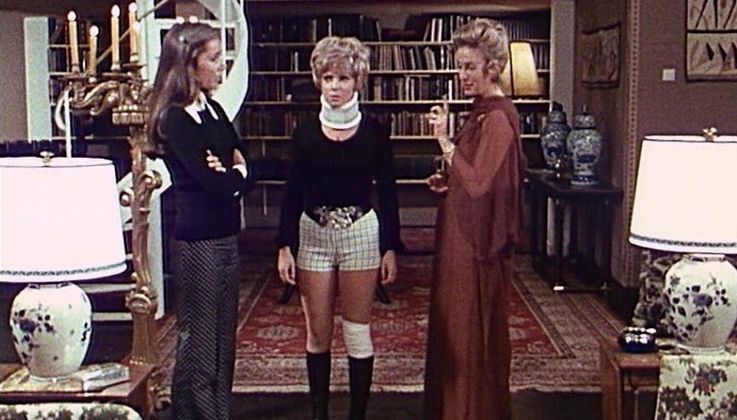 While today’s viewers may look, with some amusement, down on this strange German attempt at being different, at the time it was produced this was groundbreaking. The idea of women taking over the investigator’s job was absolutely unthinkable for Germany at that time. It would take five more years, until 1978, before the first female police inspector would appear in Tatort (an extremely long-running and realistic crime investigation series, still being made today). That would eventually help lead to a lot of TV-Krimi series of female police investigators in the 1990s.
While today’s viewers may look, with some amusement, down on this strange German attempt at being different, at the time it was produced this was groundbreaking. The idea of women taking over the investigator’s job was absolutely unthinkable for Germany at that time. It would take five more years, until 1978, before the first female police inspector would appear in Tatort (an extremely long-running and realistic crime investigation series, still being made today). That would eventually help lead to a lot of TV-Krimi series of female police investigators in the 1990s.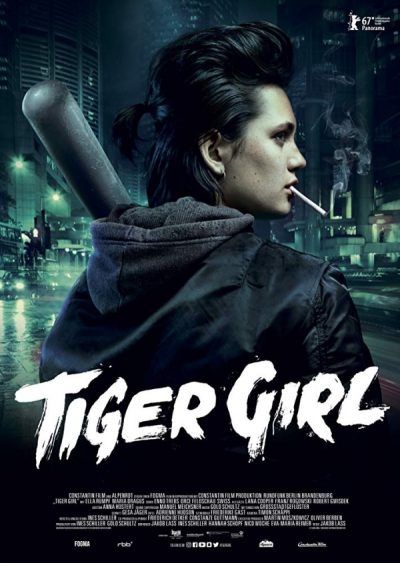 Maggie (Dragus) just failed the police entry exam in humiliating fashion, and is now taking a course to become a security officer, despite her meek nature. She encounters Tiger (Rumpf), a street punk girl who is everything Maggie is not: brash, confident and perfectly willing to go toe-to-toe with anyone she feels deserves it. The pair strike up an unlikely friendship, with a purloined uniform allowing Tiger to join Maggie in her security work, and in turn engage her increasing fondness for mayhem and violence. Meanwhile, Tiger’s example helps bring Maggie – or ‘Vanilla’, as Tiger calls her in half-mocking endearment – out of her shell. Though Tiger’s drug-dealing friends are less than impressed to find her palling around with a wannabe cop. And as Maggie begins to adopt a more… physical approach to confrontation, it becomes clear that Tiger’s restraint is something Maggie does not possess.
Maggie (Dragus) just failed the police entry exam in humiliating fashion, and is now taking a course to become a security officer, despite her meek nature. She encounters Tiger (Rumpf), a street punk girl who is everything Maggie is not: brash, confident and perfectly willing to go toe-to-toe with anyone she feels deserves it. The pair strike up an unlikely friendship, with a purloined uniform allowing Tiger to join Maggie in her security work, and in turn engage her increasing fondness for mayhem and violence. Meanwhile, Tiger’s example helps bring Maggie – or ‘Vanilla’, as Tiger calls her in half-mocking endearment – out of her shell. Though Tiger’s drug-dealing friends are less than impressed to find her palling around with a wannabe cop. And as Maggie begins to adopt a more… physical approach to confrontation, it becomes clear that Tiger’s restraint is something Maggie does not possess.